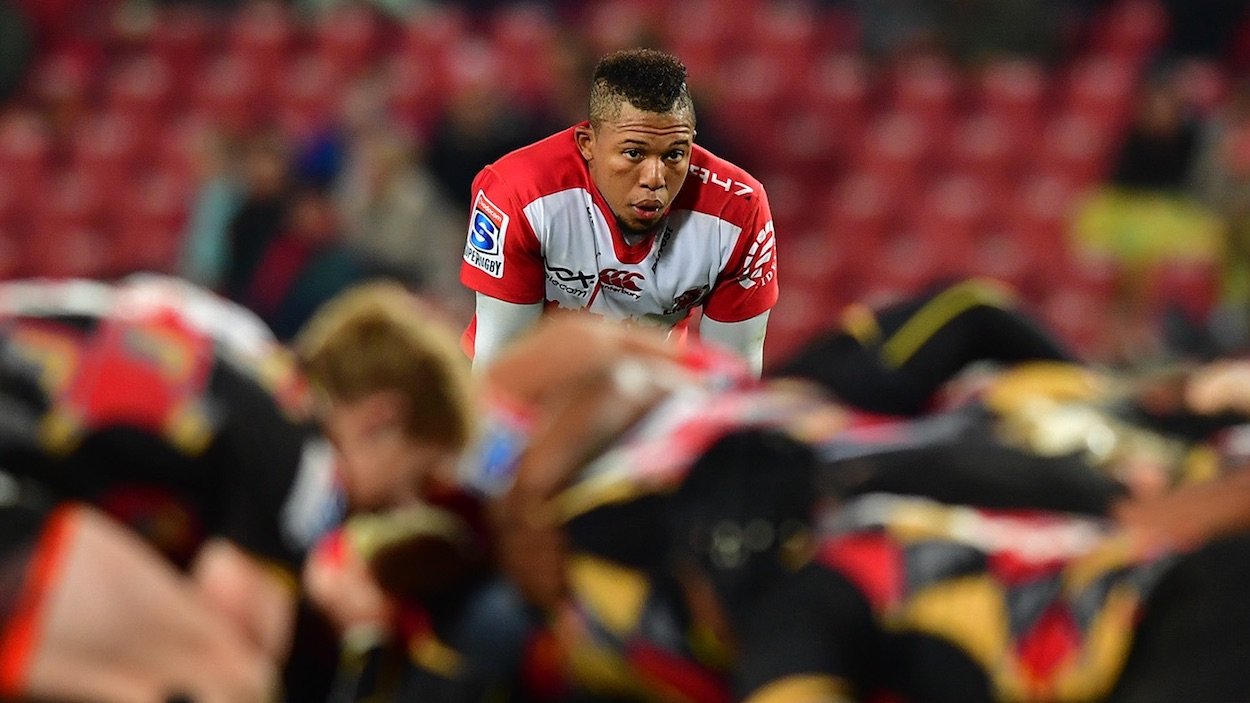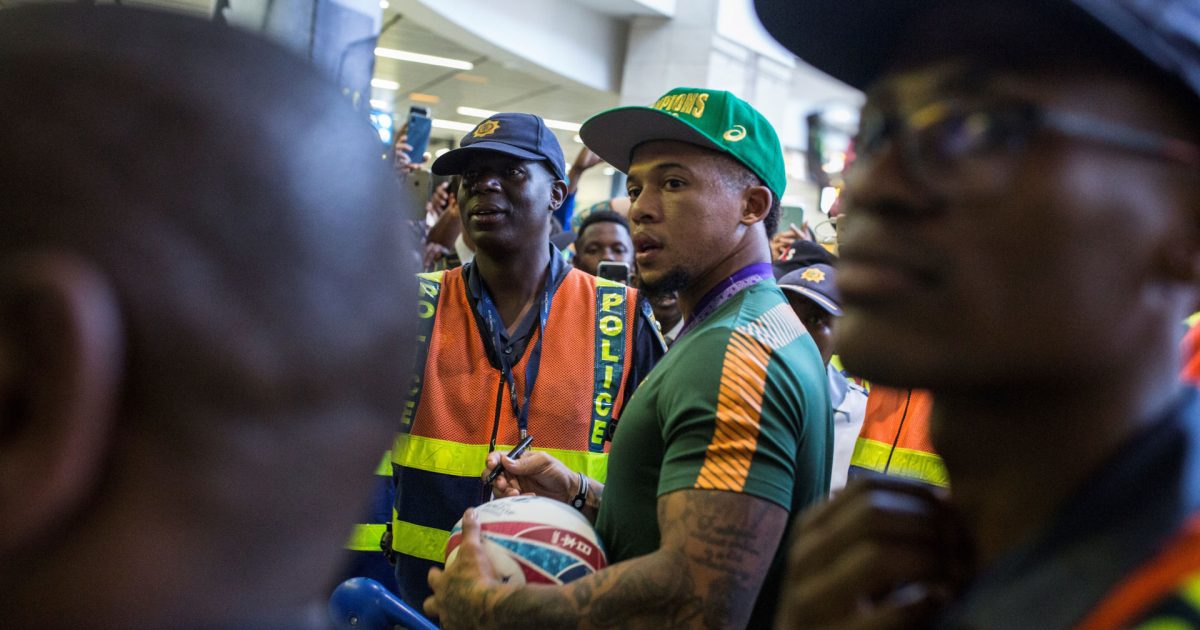The sad demise of Elton Jantjies

You didn’t have to be a Lions supporter to fall in love with the Johannesburg-based club during their most successful period in Super Rugby between 2016 and 2018. Of course, they didn’t win the thing. Three consecutive finals defeats to New Zealand opposition represented an impenetrable ceiling that could not be breached. Still, they played an attacking brand that was soon dubbed ‘Lions rugby’.
The beating heart of this enterprising play was Elton Jantjies. The fly-half established himself in the 2011 Currie Cup final, slotting all eight of his kicks from the tee as well as a drop goal in a 42-16 rout of the Sharks, but it was what he did with ball in hand that dazzled.
Jantjies’ soft touches off either shoulder evoked involuntary intakes of breath. His desire to put runners into space, rather than compel them into contact, felt like something fresh. Under the tutelage of Carlos Spencer, one of the most thrilling players of his generation, Jantjies was starting to mimic his sensei’s moves.
“He’s got a very bright future ahead of him,” Spencer said of Jantjies in 2012. “He is keen to learn and wants to develop. There’s not many around, those sorts of players come up every now and then. You’ve just got to lead them in the right direction. He’s a pretty gifted player.”
South Africans have always been sceptical of flashy fly-halves. Naas Botha, whose critics accused him of finishing every game with an unblemished jersey, set a benchmark in the years just before the Springboks’ return from isolation. First and foremost, his predecessors have needed to be accurate from the tee and efficient when kicking out of hand. As professionalism took hold, they also needed to be physical when tackling and robust enough to carry to the line.
Anything else, including some important traits like unlocking opposition defences, were seen as bonuses. The fact that South Africa won World Cups with Joel Stranksy and Butch James at 10 is evidence of this, while those around them, Jannie de Beer, Andre Pretorius and Morne Steyn, underline the argument.
And so, every time Janjties played a no-look pass off the wrong foot, or spiralled a 20-yarder when kicking for touch would have been the safer option, he divided the room. Those who regard rugby as nothing more than something to be enjoyed hopped aboard the bandwagon. Those who view winning as the thing that matters most of all voiced their concern around a show pony who was vulnerable to the occasional gaffe.
There were other things too. Jantjies was criticised for his unorthodox haircuts and apparent aloofness on the field. His skin colour also played a role in the way he was viewed by the public. ‘Non-white’ Springboks were no longer a novelty by the time he became an established member of the squad, but were usually found on the wing, at scrum-half or occasionally in the pack and midfield.

Fly-half is the most cerebral position in the game and, whether by design or accident, South African rugby coaches had failed to develop a ‘non-white’ pivot who could hold down the role at the elite level. Perhaps this is a coincidence. Perhaps this was a consequence of a lack of role models. Or maybe this mirrors the dearth of black quarterbacks in the American NFL where astute tacticians were asked to run the hard yards at wide receiver or cornerback, rather than serve as the on-field general.
Not that Lions supporters were overly concerned. With Faf de Klerk inside Jantjies, Malcolm Marx directing traffic in the pack, and Warren Whiteley as captain, Ellis Park was treated to counterattacks, coast-to-coast tries and too many offloads to fit into a highlights package. This was a side that was relegated from the ring-fenced Super Rugby because they were stinking up the place. Now they were the envy of South African rugby.
But without a title to show for his panache, a theory gained traction that Janjties didn’t have the chops to lead the Springboks winning machine. Despite starting 11 games in a row during the 2016/17 season, he was soon reduced to a deputy position as Handre Pollard took firm control of the wheel.
There were moments to suggest that Jantjies’ contributions were still valued. He was an integral member of the 2019 World Cup squad and came off the bench to kick nine points and steal a victory over the All Blacks on the Gold Coast in 2021. But his star was waning.
An unsuccessful return to Japan – after stints with the Urayasu D-Rocks in the South African off-season – saw him play just once for the Osaka Red Hurricanes in 2022. Injury cut him short but again, those old concerns continued to haunt him. It seemed as if this conjurer had run out of tricks.
Then came reports of his arrest after he caused damage on a flight from Dubai to Johannesburg. The charges were dropped, but the story involving his bloody fists banging on a door as a frightened flight attendant cowered behind left a sour taste.
That was followed by rumours of an affair with the Springboks dietician and a slew of unpaid hotel bills. Jantjies’ wife publicly lambasted the journalists who broke the story but the Springboks’ decision to cut ties with the player suggested there was some truth to the gossip.
Jantjies last played for his country in the 2022 Rugby Championship, coming on as a 60th minute substitute in a 25-17 loss to Australia. That could well be his last appearance for a number of factors, not least the pending outcome of a B-sample urine test after initial results tested positive for the banned substance clenbuterol.
The way back to Test rugby now looks unlikely. He just turned 33, is currently playing in the French second division with Agen, and has been swiftly overtaken by Manie Libbok, a player who is not too dissimilar to Jantjies himself in that he plays attacking, front-foot rugby.
Libbok’s rise should be celebrated, but it also provides an opportunity to contemplate what we might have had with Jantjies. With so much attacking talent floating around, and a new approach to the Springboks backline, there’s no telling how Jantjies might have fared if given the same licence he had with the Lions.
Many will cheer at his demise as they give each other knowing looks, pleased with themselves that they predicted the fall of a flawed man. Others, though, will remember the way he lit up not only Johannesburg, but an entire nation.
























